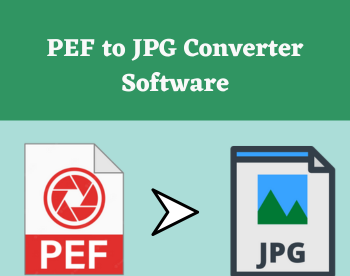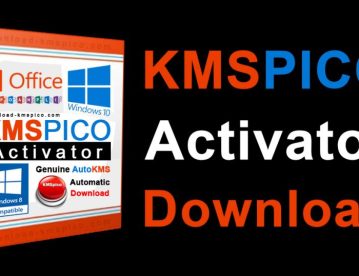4 Best Free Open Source Signal Generator Software For Windows
Here is a list of best free open source signal generator software for Windows. These signal generators are similar to standard signal generators through which users can generate custom signals. Unlike most other signal generators, these signal generators, tone generators, or frequency generators are open source. As they are open source, thus users can download and edit the source codes of these generators without any restriction.
Through all these generates, users can generate and listen to sound signals. Besides this, these generators also show signals in the form of waveforms. Although, these generators use different paths to generate signals. In some generators, users need to manually adjust frequency, amplitude, phase, modulation, etc., audio parameters to generate signals. On the other hand, some generators can generate signals only by using the frequency values. The process to generate signals is quite simple in all these software. Still, to help you out, I have included the necessary signal generation steps in the description of each software.
In some software, users also get advanced analysis tools to analyze and view signal frequency, signal strength, signal phase, etc. Besides this, tools to save the generated signals is also offers by some. Go through the list to know more about these open source software.
My Favorite Open Source Signal Generator Software For Windows:
Sine Generator is my favorite software because it allows users to create, view, and listen to various types of custom signals.
You can also check out lists of best free Open Source Password Generator, Open Source Audio Noise Reduction, and Open Source QR Code Generator software for Windows.
Sine Generator
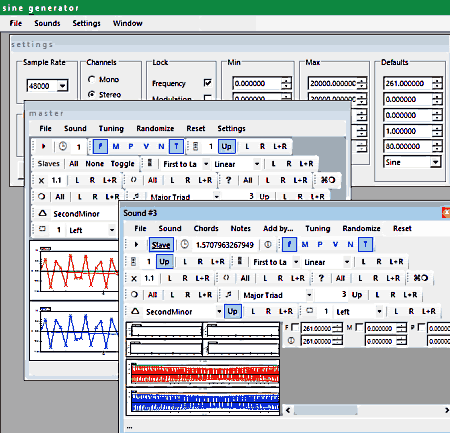
Sine Generator is a free open source signal generator software for Windows. This software generates various types of signals by combining sine and square waves into a single waveform. It also offers many tools to manually adjust various signal parameters to make a fully custom signal. Some of the parameters that users can adjust by themself are Frequency, Modulation, Phase, Noise, Volume, Sample Rate, Audio Bitrate Resolution, etc. In addition to that, users can also view and analyze the waveform of the generated signal. Now, check out the below steps to generate signals using this software.
How to generate signals using Sine Generator:
- Start this software and go to Settings to local signal parameters (frequency, modulation, noise, etc.). Besides this, it also lets users manually specify the values of different signal parameters. Other than that, users can specify the signal sample rate and channels from this section.
- After that, go to Sounds > New section and manually adjust chords (second minor, second major, third major, etc.), notes, etc.
- Lastly, click on the play button to view and listen to the generated sound. Users can save the final signal in the form of a Sound File (SGS).
This software also offers a handy Randomize section through which users can generate Weird Sounds, Random Sine signals, Random Square signals, etc.
Final Thoughts:
It is a feature-rich open source signal generator software that offers the essential tools to create, view, and listen to fully custom signals.
AUDio MEeasurement System
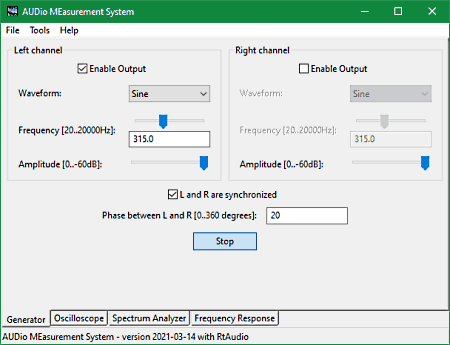
AUDio MEeasurement System is a free open source signal generator software for Windows, Linux, BSD, and macOS. As its name suggests, it is mainly an audio measurement software. To measure audio, it offers multiple measurement sections namely Oscilloscope, Spectrum Analyzer, and Frequency Response.
Now, to generate signals, it offers a dedicated Generator section. This section allows users to choose desired signal waveform, frequency, and amplitude to generate signals of various types. To review signals, users can listen to the generated sound and use signal measurement sections. Now, follow the below steps to generate signals using this open source signal generator.
How to generate signal using AUDio MEasurement System:
- Launch this software and go to the Generate section.
- After that, select a waveform from various available ones like Sine, Rectangular, Saw, Triangle, etc.
- Next, specify the signal frequency and amplitude.
- After that, enable output of both left and right channels.
- Lastly, hit the Start button to listen to generated signal. To view generated waveform of the generated signal, use the Oscilloscope section.
This software also lets users save the generated signal in the form of a Configuration File.
Final Thoughts:
It is a good open source signal generator software through which users can generate custom signals.
Windows Console Tone Generator
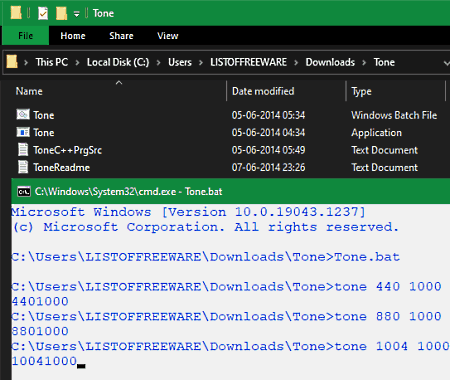
Windows Console Tone Generator is another free open source signal generator software for Windows. It is a console-based software that doesn’t come with a graphical user interface. To operate it, users need to use the command prompt. Although to specify the signal parameters, users need to edit its BAT file. Unlike most other similar software, it doesn’t show the waveform of the generated signal. Instead, it only generates and plays the signal in the form of audio. Now, follow the below steps to generate signals using this software.
How to generate signal using Windows Console Tone Generator:
- Open up the Tone.bat file of this software in the notepad.
- After that, manually specify the signal frequency that you want to generate.
- Now, save all the changes and close the file.
- Lastly, open the bat file using the command prompt to listen to the generates signal tones.
Limitations:
- This software doesn’t come with a graphical user interface.
- It doesn’t let users save the generated sound signals.
Final Thoughts:
It is a decent open source signal generator software through which users can generate sound signals of different frequencies.
zither tuner
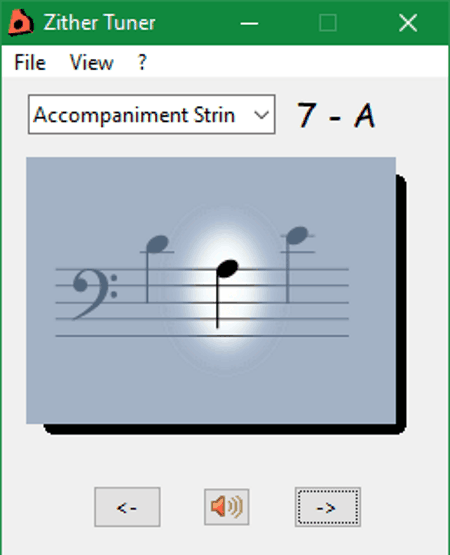
zither tuner is yet another free open source signal generator software for Windows. This software is mainly designed as a tone generator graphical user interface for the tuning of a zither musical instrument. To do the tuning, it offers multiple string modes namely Fretted Strings, Accompaniment Strings, Bass Strings, and Contrabass Strings. Besides this, it also offers an interactive interface to change string notes and generate custom sound signals. Now, follow the below steps.
How to generate signals using zither tuner:
- Start this software and choose a string mode from various available ones.
- After that, go to the View > Stave option to manually do the signal Hz calibration.
- Next, choose Munich or Vienna system and switch between notes using forward and back arrows to generate sound signals.
Limitation:
- Using this software, users can generate limited sets of sound signals.
Final Thoughts:
It is another good open source signal generator software that anyone can use to generate sound signals.
Naveen Kushwaha
Passionate about tech and science, always look for new tech solutions that can help me and others.
About Us
We are the team behind some of the most popular tech blogs, like: I LoveFree Software and Windows 8 Freeware.
More About UsArchives
- May 2024
- April 2024
- March 2024
- February 2024
- January 2024
- December 2023
- November 2023
- October 2023
- September 2023
- August 2023
- July 2023
- June 2023
- May 2023
- April 2023
- March 2023
- February 2023
- January 2023
- December 2022
- November 2022
- October 2022
- September 2022
- August 2022
- July 2022
- June 2022
- May 2022
- April 2022
- March 2022
- February 2022
- January 2022
- December 2021
- November 2021
- October 2021
- September 2021
- August 2021
- July 2021
- June 2021
- May 2021
- April 2021
- March 2021
- February 2021
- January 2021
- December 2020
- November 2020
- October 2020
- September 2020
- August 2020
- July 2020
- June 2020
- May 2020
- April 2020
- March 2020
- February 2020
- January 2020
- December 2019
- November 2019
- October 2019
- September 2019
- August 2019
- July 2019
- June 2019
- May 2019
- April 2019
- March 2019
- February 2019
- January 2019
- December 2018
- November 2018
- October 2018
- September 2018
- August 2018
- July 2018
- June 2018
- May 2018
- April 2018
- March 2018
- February 2018
- January 2018
- December 2017
- November 2017
- October 2017
- September 2017
- August 2017
- July 2017
- June 2017
- May 2017
- April 2017
- March 2017
- February 2017
- January 2017
- December 2016
- November 2016
- October 2016
- September 2016
- August 2016
- July 2016
- June 2016
- May 2016
- April 2016
- March 2016
- February 2016
- January 2016
- December 2015
- November 2015
- October 2015
- September 2015
- August 2015
- July 2015
- June 2015
- May 2015
- April 2015
- March 2015
- February 2015
- January 2015
- December 2014
- November 2014
- October 2014
- September 2014
- August 2014
- July 2014
- June 2014
- May 2014
- April 2014
- March 2014
